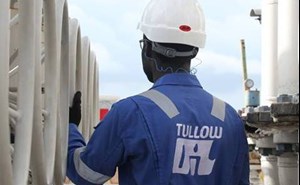Tullow Oil leverages rising oil prices to speed debt repayment
LONDON (Bloomberg) --Tullow Oil said it hopes to accelerate debt repayments after crude prices climbed to a one-year high.
The Africa-focused producer, saddled with $2.4 billion of net debt, is among oil firms buoyed by the recent surge in prices as demand gradually recovers from 2020’s unprecedented slump. Tullow’s shares have jumped more than 80% this year as the company starts to turn its back on a tough period of drilling setbacks, management departures, collapsing prices and mounting borrowings.
Chief Executive Officer Rahul Dhir, who took over last July, is putting the explorer’s West Africa assets at the core of an investment plan aimed at cutting costs and shoring up the balance sheet.
Tullow could quicken debt repayments, Chief Financial Officer Les Wood said in an interview on Wednesday, while Dhir suggested it could also ramp up drilling in West Africa by adding a rig if crude prices remain strong. The company already plans four wells in Ghana from April.
The shares climbed as much as 5%, and traded up 3.8% at 53.94 pence as of 10:24 a.m. in London.
Debt Erosion
Like its peers around the world, Tullow suffered the effects of the coronavirus crisis, with oil markets crashing as demand sank. It reported a 2020 loss of $1.2 billion, citing exploration writeoffs and impairments, and “pre-financing” cash flow of $625 million. It sees that cash flow at about $200 million this year at $50 a barrel. Brent crude is currently trading above $67 in London.
Sustained high oil prices would mean a shorter timeline for Tullow to reduce net debt to as low as $1 billion, CFO Wood said. The company has been discussing refinancing options with creditors.
“Management remain deliberately coy about refinancing plans as they work to resolve 2021-22 debt maturities, but the combination of self-help and improvement in Brent prices can only aid negotiations with creditors,” James Hosie, an analyst at Barclays Plc, said in a note.
Tullow also said Wednesday it’s committing to carbon neutrality by 2030 and aims to eliminate gas flaring by 2025. The company plans to be “net-zero” on Scope 1 and 2 emissions by the end of the decade, by boosting operational efficiency and potentially by using carbon offsets. That refers to emissions from Tullow’s own operations, as opposed to Scope 3, which are those generated from energy products used by its customers.



